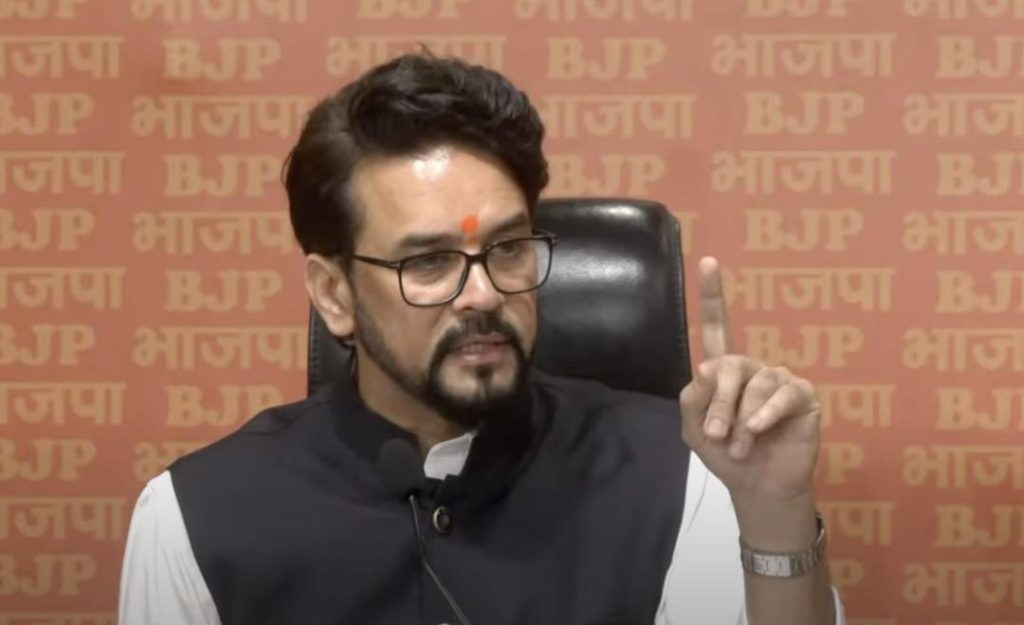
Congress & CPI Made Bhimrao Ambedkar Lose the Poll in 1952: BJP
In a recent statement, BJP MP Anurag Thakur has made some startling revelations about the country’s electoral history. Speaking at an event, Thakur claimed that the Congress party, along with its communist ally CPI, played a significant role in defeating Dr. Bhimrao Ambedkar, a stalwart of the Dalit community and a key architect of the Indian Constitution, in the 1952 general elections.
According to Thakur, the election was marred by irregularities and widespread corruption, which allowed the Congress-CPI combine to manipulate the polls and secure Ambedkar’s defeat. He pointed out that a staggering 74,333 votes were rejected in the election, citing this as evidence of the extent of the corruption.
Thakur’s statement has sent shockwaves across the political spectrum, with many left wondering about the circumstances surrounding Ambedkar’s electoral defeat. Ambedkar, who was a key figure in the drafting of the Indian Constitution and a champion of Dalit rights, was a strong contender in the election, which was held in the first year of India’s independence.
Ambedkar, who was the leader of the Scheduled Castes Federation, was contesting from Bombay (now Mumbai) against Kaka Saheb Jadhav, a Congress candidate. The election was seen as a significant test of the party’s strength and popularity, with Ambedkar’s candidacy seen as a challenge to the Congress party’s dominance.
However, despite being a powerful symbol of the Dalit movement, Ambedkar’s chances of victory were ultimately dashed by the electoral irregularities and corruption orchestrated by the Congress-CPI combine. The exact circumstances of the election have been shrouded in mystery for decades, with many historians and political observers pointing to the widespread manipulation of the polls as a major factor in Ambedkar’s defeat.
Thakur’s statement has sparked a renewed interest in the election, with many calling for an investigation into the irregularities and corruption that marred the poll. The BJP MP’s remarks have also raised questions about the Congress party’s role in perpetuating electoral corruption, with some arguing that the party’s actions in 1952 laid the foundation for the widespread corruption that plagues Indian politics today.
The Indian Constitution, which Ambedkar played a pivotal role in drafting, enshrines the principles of equality and justice for all citizens. However, the country has struggled to achieve these ideals, with the Dalit community remaining one of the most marginalized and oppressed groups in Indian society.
Ambedkar’s electoral defeat in 1952 was a significant setback for the Dalit movement, which had been gaining momentum in the years leading up to the election. The defeat was seen as a major blow to the movement, which had been pushing for greater representation and protection for Dalits in Indian politics.
In recent years, the BJP has made significant efforts to co-opt the Dalit vote, with the party’s leaders making overtures to the community and seeking to capitalize on the growing resentment among Dalits towards the Congress party. The party’s attempts to woo the Dalit vote have been met with mixed results, with some Dalits expressing skepticism about the BJP’s commitment to their cause.
Despite these challenges, Thakur’s statement has sparked a renewed interest in Ambedkar’s life and legacy, with many calling for greater recognition of his contributions to Indian politics and society. Ambedkar’s vision of a just and equal society remains a powerful symbol of the Dalit movement, and his electoral defeat in 1952 serves as a reminder of the ongoing struggle for social justice and equality in India.
In conclusion, Anurag Thakur’s statement has shed new light on the circumstances surrounding Ambedkar’s electoral defeat in 1952, and highlights the ongoing struggle for social justice and equality in India. The BJP MP’s remarks have sparked a renewed interest in Ambedkar’s life and legacy, and serve as a reminder of the importance of protecting the rights and interests of the Dalit community.
Source:






